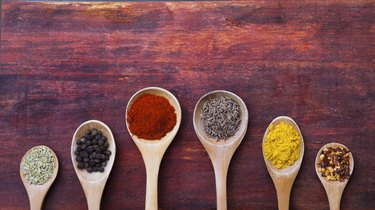
If controlling your blood pressure means a low-sodium diet, consider cayenne pepper as a salt alternative. Peppers and spices can enhance food tremendously, and they may have a blood-pressure-lowering (hypotensive) effect, though more research is needed on that topic.
Read more: List of Low-Sodium Diet Foods
Video of the Day
Video of the Day
Historically, spices such as cinnamon, black pepper, turmeric and cayenne have been used as herbal medicines in traditional medicine. Many of these have come under investigation in Western medicine, too, as researchers study possible complementary or adjunct therapies with hopes that they might prove therapeutic with few side effects, according to research published in April 2016 in the Journal of Clinical & Experimental Cardiology.
Cayenne Pepper and Blood Pressure
The Journal of Clinical & Experimental Cardiology research — a review of studies investigating the impact of various dietary components on high blood pressure — also mentions studies that suggest that large quantities of peppers rich in capsaicin, the substance that gives peppers their heat, may induce hypertension. However, the studies referenced in the review describe a single individual's hypertensive crisis, which is not enough to draw a meaningful conclusion.
Conversely, an article published in February 2018 in Clinical Nutrition ESPEN (an official journal of the European Society for Clinical Nutrition and Metabolism), which examined the association between chili intake and hypertension, found just the opposite effect in a far larger number of people.
The study followed 13,670 adults over a 20-year period, from 1991 to 2011, collecting dietary data and blood pressure readings at eight intervals during that time frame. The researchers found an inverse association between chili consumption and high blood pressure: the more chilies consumed, the lower the incidence of hypertension. Though seen as encouraging data, studies of this nature — dependent on the dietary records of individuals — are notoriously unreliable.
"Most of the research on capsaicin and blood pressure are animal studies, and they're older studies," says Ashli Greenwald, RDN, LDN, a registered dietitian with Johns Hopkins Bayview Medical Center in Baltimore. "There really are no definitive studies linking the two."
"There is more out there in terms of the effect of capsaicin on heart disease and hyperlipidemia," she says. "There are also some investigations of capsaicin in terms of headache prevention, post-operative pain and nausea, but the strongest studies have been done in pain management."
For the purpose of pain management, capsaicin is typically used as a patch or topical ointment, often available over the counter. "It works by blocking pain signals to the brain, and there has been a lot of research supporting its use in rheumatoid arthritis, fibromyalgia and neuropathy," Greenwald says.
Enhancing the DASH Diet
Among the lifestyle cornerstones of blood pressure management is the Dietary Approaches to Stop Hypertension (DASH) diet. According to the Mayo Clinic, the DASH diet is a lifelong plan meant to treat or prevent high blood pressure without medication. It has been shown to reduce systolic blood pressure by 11.4 millimeters of mercury (mm Hg) and diastolic blood pressure by 5.5 mm Hg.
The DASH diet is a high-fiber, low-fat diet built around fruits and vegetables, lean protein and low-fat dairy. It is also low in sodium. According to the Mayo Clinic, a typical American diet consists of 3,400 milligrams or more of sodium a day. On the other hand, the standard DASH diet aims for less than 2,300 milligrams of sodium a day, and the lower-sodium DASH diet restricts sodium to less than 1,500 milligrams daily.
Because it's such a departure from the typical American diet, the DASH diet may be hard to stick to for some. The Mayo Clinic suggests using sodium-free spices or flavorings to compensate for salt, and this is where cayenne can play a role.
"Unless you're sensitive to spicy foods — for example, if they trigger heartburn or irritate your stomach — I would incorporate peppers if you like," Greenwald says. "Cayenne pepper is generally regarded as safe. I wouldn't necessarily advise using it as a supplement, but you can add it to marinades or sauces or salad dressings. However you choose to incorporate it, cayenne pepper is fine."
Read more: 9 Delicious DASH Diet-Friendly Recipes
- Journal of Clinical & Experimental Cardiology: "Role of Dietary Components in Modulating Hypertension"
- Clinical Nutrition Espen: "Chili Intake Is Inversely Associated With Hypertension Among Adults"
- Ashli Greenwald, MS, RDN, LDN, dietitian, Johns Hopkins Bayview Medical Center, Baltimore
- Mayo Clinic: "DASH Diet: Healthy Eating to Lower Your Blood Pressure"
Is this an emergency? If you are experiencing serious medical symptoms, please see the National Library of Medicine’s list of signs you need emergency medical attention or call 911.